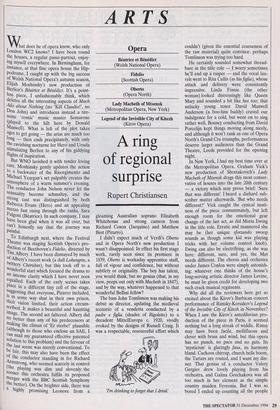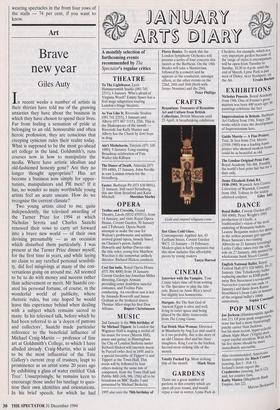ARTS
Opera
Beatrice et Benedict (Welsh National Opera) Fidelio (Scottish Opera) Oberto (Opera North) Lady Macbeth of Mtsensk (Metropolitan Opera, New York)
A ring of regional surprise
Rupert Christiansen
Wat does he of opera know, who only London WC2 knows? I have been round the houses, a regular passe-partout, enjoy- ing myself everywhere. In Birmingham, for instance, at that fine opera house the Hip- podrome, I caught up with the big success of Welsh National Opera's autumn season, Elijah Moshinsky's new production of Berlioz's Beatrice et Benedict. It's a point- less piece, I unfashionably think, which deletes all the interesting aspects of Much Ado about Nothing (no 'Kill Claudio!', no Don John) and introduces instead a tire- some 'comic' music master Somarone (played to the hilt here by Donald Maxwell). What is left of the plot takes ages to get going — the arias are much too long then ends precipitately, with only the ravishing nocturne for Hero and Ursula stimulating Berlioz to any of his giddying flights of inspiration. But WNO lavished it with tender loving care. Moshinsky gently updates the action to a backwater of the Risorgimento and Michael Yeargan's set palpably creates the atmosphere of a warm summer's evening. The conductor John Nelson never let the sensuality become schmaltzy, and the strong cast was distinguished by both Rebecca Evans (Hero) and an appealing mezzo fast rising through the ranks, Sara Fulgoni (Beatrice). In such company, I may have been glad when it was all over, but can't honestly say that the journey was Painful, Theatre Edinburgh next, where the Festival theatre was staging Scottish Opera's pro- duction of Beethoven's Fidelio, directed by Tim Albery. I have been dismayed by much Of Albery's recent work (a dull Lohengrin, a twittery Cherubin), but this took off to a Wonderful start which focused the drama to an intense clarity which I have never seen equalled. Each of the early scenes takes Place in a different tiny cell of the stage, Suggesting that everyone, Pizarro included, is in some way shut in their own prison, their vision limited, their action circum- scribed. It makes a beautiful and haunting linage. The second act faltered: Albery did no better than any of his predecessors at making the climax of 'Er sterbe!' plausible (although to those who enclose an SAE, I can mail my guaranteed effective patented solution to this problem) and the fervour of the last scene was merely conventional. To be fair, this may also have been the effect of the conductor standing in for Richard Armstrong, who seemed scarcely in control (the playing was dim and slovenly: the sooner this orchestra fulfils its proposed merger with the BBC Scottish Symphony the better). On the brighter side, there was a highly promising Leonore from a gleaming Australian soprano Elizabeth Whitehouse and strong cameos from Richard Coxon (Jacquino) and Matthew Best (Pizarro).
I didn't expect much of Verdi's Oberto and in Opera North's new production I wasn't disappointed. In effect his first stage work, rarely seen since its premiere in 1839, Oberto is workaday apprentice stuff, full of vigour and confidence, but without subtlety or originality. The boy has talent, you would think, but no genius (that, in my view, peeps out only with Macbeth in 1847), and by the way, whatever happened to that wonderful Bellini fellow?
The bass John Tomlinson was making his debut as director, updating the medieval scenario of a vendetta conducted by a padre e figlia (shades of Rigoletto) to a decadent MittelEuropa c. 1920, vividly evoked by the designs of Russell Craig. It was a respectable, resourceful effort which 'I'm drinking to forget that I drink' couldn't (given the essential coarseness of the raw material) quite convince: perhaps Tomlinson was trying too hard.
He certainly sounded somewhat thread- bare in the title role — I worry sometimes he'll end up a rasper — and the vocal lau- rels went to Rita Cullis (as his figlia), whose attack and delivery were consistently impressive. Linda Finnie (the other woman) looked distressingly like Queen Mary and sounded a bit like her too; that unlucky young tenor David Maxwell Anderson (a boo-hiss baddy) craved our indulgence for a cold, but went on to sing rather well. Bouncy conducting from David Porcelijn kept things moving along nicely, and although it won't rank as one of Opera North's Grand Cru triumphs, performances deserve larger audiences than the Grand Theatre, Leeds provided for the opening night.
In New York, I had my best time ever at the Metropolitan Opera. Graham Vick's new production of Shostakovich's Lady Macbeth of Mtsensk drags this most conser- vative of houses into the late 20th century — a victory which may prove brief: 'Sure that was different' I heard a diehard sub- scriber mutter afterwards. 'But who needs different?' Vick caught the cynical nasti- ness of the piece consummately, but left enough room for the emotional gear change of the last act, as did Maria Ewing in the title role. Erratic and mannered she may be (her unique sforzando swoop sounds as though some kid was playing tricks with her volume control knob). Ewing can also be electrifying, as she was here: different, sure, and yes, the Met needs different. The chorus and orchestra under James Conlon were simply astonish- ing: whatever one thinks of the house's long-serving artistic director James Levine, he must be given credit for developing two such crack musical regiments.
Why did all the reviewers here get so excited about the Kirov's Barbican concert performance of Rimsky-Korsakov's Legend of the Invisible City of Kitezh in November? When I saw the Kirov's antediluvian pro- duction of the piece in Paris, it seemed nothing but a long streak of widdle. Rimsy may have been facile, mellifluous and clever with brass and wind, but this opera has no punch, no pace and no guts. Its `mysticism' is glaringly faux, its harmony bland. Cuckoos chirrup, church bells boom, the Tartars are routed, and I want my din- ner. That genius of a conductor Valery Gergiev drew lovely playing from his orchestra, and Galina Gorchakova was all too much in her element as the simple country maiden Fevronia. But I was so bored I ended up counting all the people wearing spectacles in the front four rows of the stalls — 74 per cent, if you want to know.



























































 Previous page
Previous page